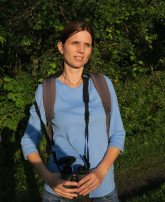Since 1999, I have focused on the population and behavioral ecology of predators, particularly the Boreal Owl, and the population dynamics of small mammals, which constitute an important prey for raptors. This research included, in addition to intensive fieldwork, the development and use of a sophisticated camera system called the Smart Nest Box, which we deployed at more than 60 owl nests.
My alma mater´s study area is located in the eastern part of the Ore Mountains, a region severely impacted by air pollution. During the 1970s and 1980s, this region experienced some of the highest levels of acid-air pollution in Central Europe, leading to widespread ecosystem collapse. Since then, habitat restoration efforts have included various experiments, such as planting non-native Blue Spruce plantations, which were later replaced with native Norway Spruce to restore ecological balance.
From 2012 to 2020, I expanded my research focus by launching a Citizen Science project called Birds Online. This initiative aimed to engage the public, especially students and teachers at all educational levels, in remotely observing bird nesting behavior using our Internet-connected Smart Nest Boxes. While participants gained insights into birdlife, university students developed methodologies for these specially designed camera systems and analyzed video recordings for their theses and research projects. The Birds Online project has amassed an extensive collection of more than two million short (30-second) video recordings, capturing bird nesting activities between 2016 and 2024, primarily focusing on great tits. These recordings remain available for further analyses.
Since 2020, I have been focusing on academic activities, including the development of innovative ecology and citizen-science teaching programs, as well as enhancing practical training opportunities for students in the Ore Mts. study area.
Another significant development in my research comes with 2025. With support from the Czech Science Foundation (GAČR), I am currently developing our international research team to deepen our understanding of the role of pollutants in contaminated ecosystems. The core study area for this research remains the Ore Mountains study area, now expanded to include one additional polluted site and one control site. Our primary objective is to investigate how pollutants impact the ecology, dynamics, and health of small mammals—species critical for maintaining stability within food chains—and to establish small mammals as vital bioindicators of contaminated ecosystems.





 +420 22438 2923
+420 22438 2923

